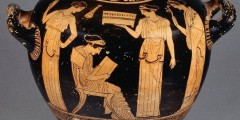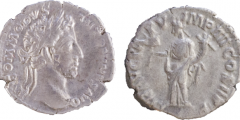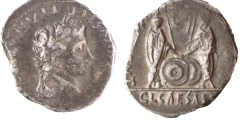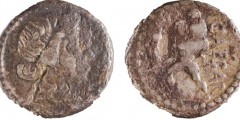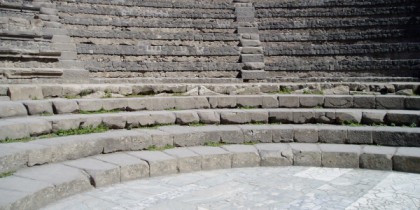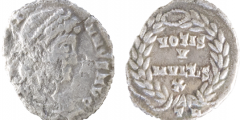Anything but an essay
February 23, 2015
Dr Lynn Fotheringham casts an eye over the inventive work currently going on in her Independent Second-Year Project module. The Independent Second-Year Project, or ISYP, is the Department’s flagship non-traditional assessment module, and a cornerstone of our employability programme. Students choose not only which area of the Classical world they want to explore and how …
Classical Consolations
February 9, 2015
Undergraduate Juliet O’Brien finds solace in the classical sections of Hallward Library. Even in an age where we have all sort of comforts at our disposal, we are nowhere near achieving universal happiness. I know I’m not the only one who gets anxious in the face of coursework deadlines and exams. And for those of …
A Reign of Terror
January 20, 2015
As part of the Nottingham ‘Anniversaries through Coins’ project, Larissa Ransom describes how, on this day, 20th January 175AD, Commodus was enrolled into all sacred colleges as priest Commodus (Caesar Marcus Aurelius Commodus Antoninus Augustus) was born on 31st August 161AD to Marcus Aurelius and his wife, Faustina the Younger. He was the sole surviving …
Res publica restituta?
January 16, 2015
As part of the Nottingham ‘Anniversaries through Coins’ project, Matthew Myers describes how on this day, the 16th January in 27 BC, Octavian became Augustus. Following the defeat of his former ally Marc Antony and the Egyptian queen Cleopatra at the battle of Actium in 31 BC, Octavian emerged as the victor of civil war …
Caesar Crosses the Rubicon!
January 10, 2015
As part of the Nottingham ‘Anniversaries through Coins’ project, Michael Welbourn reports how, on this day the tenth of January, in 49 BC, Julius Caesar crossed the river Rubicon and precipitated the final crisis of the Roman republic. Tracing the roots of this momentous decision requires us to go back eleven years to 60 BC. …
Coming Soon: Theatre with a Classical Connection…
January 7, 2015
Lynn Fotheringham has been searching out theatrical productions with a classical connection over the next few months, in Nottingham, nearby cities and London. Sheffield, 13th February only, 13.00: Phaedra’s Love, semi-staged reading as part of a season of the complete works of Sarah Kane, whose reputation for writing plays with lots of on-stage violence suggests …
Drama or History?
December 15, 2014
Victoria Moore, a part-time student on the MA in The Visual Culture of Classical Antiquity, reflects on her experience of The Coronation of Poppea by Monteverdi, performed by Opera North at the Royal Theatre, Nottingham. I have to say that I am not familiar with any of Monteverdi’s operas, so my main expectation was of …
Julian ‘the Apostate’ Comes to Power
December 11, 2014
As part of the Nottingham Anniversaries through Coins project, Robert Stone describes how on this day, 11th December, in 361, the last pagan emperor Julian II (also known as Julian the Apostate) entered Constantinople as the sole ruler of the Roman Empire. Following the death of Constantine I (337), the Empire was divided between his …
The Lex Titia…
November 26, 2014
As part of the Nottingham Anniversaries through Coins project, Mike Welbourn describes how, on this day, 26th November, in 43 BC, the lex Titia was passed at Rome. By this law a board of three men was given complete control over the Roman state. The lex Titia turned Rome into a de facto dictatorship, and …
We have two blog entries today, both from doctoral students in Classics: in the first, Peter Davies, reflects on the legacy of the poet Simonides’ words in commemorating the fallen…
November 11, 2014
After the battle of Thermopylae – immortalised by Herodotus and, in our own time, given new fame by Snyder’s epic 300 – the Lyric poet Simonides wrote an encomium for the Greek dead. In 1838 John Sterling would translate some of his words thus: Of those who at Thermopylae were slain, Glorious the doom, and …


